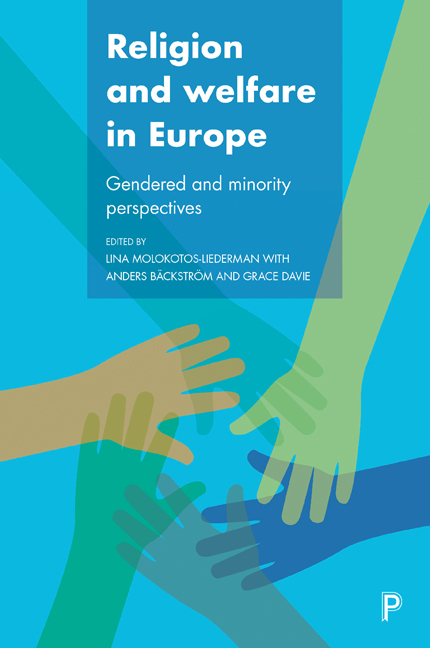Book contents
- Frontmatter
- Contents
- List of tables, figures and maps
- Acknowledgements
- Notes on contributors
- one Introduction
- Part One Thinking methodologically: approaches to research and practice
- Part Two Thinking regionally: key case studies in welfare and religion in Europe
- Part Three Gendered and minority perspectives
- Part Four Drawing the threads together
- Appendix: the WaVE team
- Index
Seven - Religion, welfare and gender: the post-communist experience
Published online by Cambridge University Press: 05 April 2022
- Frontmatter
- Contents
- List of tables, figures and maps
- Acknowledgements
- Notes on contributors
- one Introduction
- Part One Thinking methodologically: approaches to research and practice
- Part Two Thinking regionally: key case studies in welfare and religion in Europe
- Part Three Gendered and minority perspectives
- Part Four Drawing the threads together
- Appendix: the WaVE team
- Index
Summary
Introduction
This chapter is about religion, welfare and gender in post-communism, or more precisely about the role of religious organisations in welfare provision and the social position of women in post-communist countries. In order to understand the role of religion, welfare and gender, it is necessary to outline the interplay between a distinctive legacy and a complex, contradictory and markedly uneven social development. In addition, the common features of post-communist countries are identified, alongside the important differences between them, with regard to both past and present social development, and the role of religion in each country.
The discussion is based mainly on theoretical work with regard to social policy changes and socio-religious dynamics in post-communist Europe. In particular, it is inspired by the concept of variegated welfare capitalism, which perceives the modernisation and Europeanisation process as uneven, relational and multi-scalar. Furthermore, it is inspired by the concept of collectivistic religions that are not reducible to their identity-oriented expressions, but are in reality combined with individually shaped religiosity and criticism regarding the social role of a particular religion.
The theories presented frame the reflection on the empirical data gathered as part of the Welfare and Values in Europe: Transitions Related to Religion, Minorities and Gender (WaVE) project in four post-communist countries: Croatia, Poland, Latvia and Romania. Four common factors are of interest, although in slightly different ways: a weak tradition of religious involvement in welfare; controversies about the public position of churches; the dominance of a public welfare system that cannot meet the promises made to citizens; and the ways different stakeholders cooperate in each society. The position of women is taken into account in terms of tensions between traditional gender patterns, ‘communist’ and ‘post-communist’, ‘Europeanised’ gender equality ideals, and the social reality, particularly with regard to the enormous social consequences of post-communist transition.
- Type
- Chapter
- Information
- Religion and Welfare in EuropeGendered and Minority Perspectives, pp. 135 - 160Publisher: Bristol University PressPrint publication year: 2017



